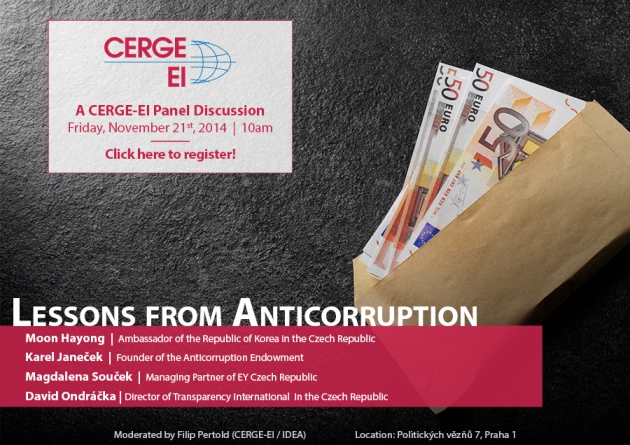Daily Events
10:00 | Special Event
Panel Discussion “Lessons from Anticorruption”
CERGE-EI is pleased to invite you to a panel discussion titled “Lessons from Anticorruption”. Corruption undermines democratic institutions, slows economic development and contributes to governmental instability. Should corruption be tackled through bottom-up or top-down processes? Can lessons from other countries be applied to the Czech Republic? At this special CERGE-EI panel discussion, leaders of government, civil society, and the private sector will come together to discuss innovative anticorruption solutions and lessons learned.
Keynote speech:
Moon Hayong, Ambassador, the Embassy of the Republic of Korea in the Czech Republic
Presentations:
Magdalena Souček, Managing Partner, EY Czech Republic
Karel Janeček, Founder, Anticorruption Endowment
David Ondráčka, Director, Transparency International in the Czech Republic
Speakers' presentations will be followed by moderated discussion led by Filip Pertold (CERGE-EI/IDEA).
Venue: CERGE-EI, Politických vězňů 7, 111 21 Prague 1
Date: November 21st, 2014
Time: 10:00 - 11:30 a.m.
The event will be held in English and will be followed by a small reception. Capacity is limited so please reserve your seat.
15:00 | Macro Research Seminar
Goethe University, Frankfurt am Main, Germany
Author: Mirko Wiederholt
Abstract: Survey data on expectations shows that households have heterogeneous inflation expectations and households’ inflation expectations respond sluggishly to realized shocks to future inflation. By contrast, in models with a zero lower bound currently used for monetary and fiscal policy analysis, households’ inflation expectations are neither heterogeneous nor sticky. This paper therefore solves a New Keynesian model with a zero lower bound and dispersed information on the side of households. The main properties of the model with heterogeneous and sticky inflation expectations are as follows: (1) the deflationary spiral in bad states of the world is less severe than under perfect information, (2) communication by the central bank about the current state of the economy (even without any change in current or future policy) affects consumption, and the sign of this effect depends on whether or not the zero lower bound binds, (3) a commitment by the central bank to increase future inflation can reduce current consumption, (4) the government spending multiplier can be negative, and (5) shocks to uncertainty can have first-order effects.
Full Text: “Empirical Properties of Inflation Expectations and the Zero Lower Bound”










